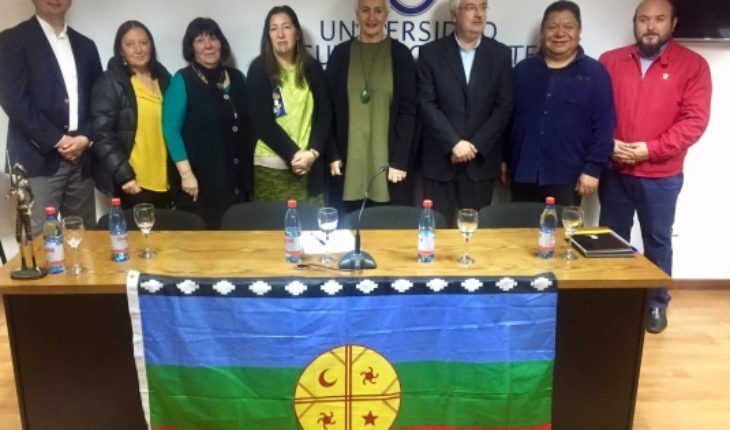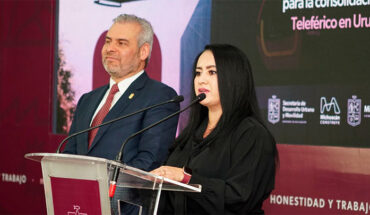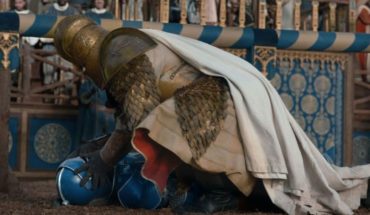This Monday 2 and Tuesday 3 September last was held the “IV Meeting of Education and Intercultural Studies: Intercultural Educational Experiences Compared between the Maori People and Mapuche”, talk which was organized together by the Miguel de Cervantes University (UMC), the Universidad Academia de Humanismo Cristiano (UAHC) and the Institute of Indigenous Development and Leadership Foundation, and which aimed to form a space for meetings and analysis between both peoples to exchange educational experiences and interculturality that allows us to advance the development and creation of an intercultural university in our country.
The event, which had in its first day at the Centro Cultural la Moneda and the closing in the Bernardo Leighton Auditorium of the UMC located at Mac Iver 370 street, was attended by Maori representatives and academics, a commission that was composed of Tania-Rose Tuataki and Norma Rosales-Anderson (from the academic initiative Te Wananga or Aotearoa), Linda Coley (of the Bethlehem Tertiary Institute), Shirley Ikkala (of Auckland University) and Kerrie Stanley (of the School of Inmersion Muori), who shared their experiences in the development of projects such as the one that gives intensive education and in their language to more than 30 thousand students of Maori culture.
“This meeting had a higher relevance because it allows not only the idea or dream of an indigenous university to be carried out, but in practical terms, with the support of Maori academics, Miguel de Cervantes University, the Academy of Humanism University Cristiano, our foundation, Mapuche mayors, Mapuche professors, Mapuche and indigenous loncos, also allows us to form a private public commission to advance the implementation of a diploma plan or program that forms leadership capacity in order to put an indigenous university in Chile is marching,” said the president of the Instituto de Desarrollo y Liderazgo Indígena, Diego Ancalao.
In the same sense, Ancalao added that “it is very relevant, because a university of the characteristics we aspire to is much more than a building, than a structure, but a university of these characteristics seeks to install the power and strength of ideas, of the of the projection and the contribution that means to development, and should begin through a curriculum generated between the Mapuche world, Mapuche academics and political authorities, so this is the beginning of the execution of a diploma from the University Commission Indígena Intercultural, which has the support of the Miguel de Cervantes universities and the Academy of Christian Humanism, which will allow us to start forming people and teams to carry out and lead this process”.
For her part, the Socialist Party Member, Emilia Nuyado, who participated in the first day, argued that “it is very important to know the various experiences that the Maori people have in these areas of education and the benefits of having universities analyze where we are in our country to move forward. Therefore, the so-called indigenous peoples is to see how they can be built from this dialogue to be themselves who raise the need and to found a university of their own and not wait for the state or other political bodies such as Congress , for example”.
“This meeting was very important because it allowed us to know the experience and progress that the Maori people have had and the recognition they enjoy in their country as first nations, which is not the case in Chile, where there is a denialist attitude towards existence of peoples as first nations, before the constitution of the Chilean state. Today we must begin to base the foundations for an intercultural university, which will allow us to advance in critical thinking, Mapuche thinking, and the possibility of being able to face the challenge of development, since from the State itself we they put forward a verticalist view of what development should be, but without the participation of the peoples, so there has been no development,” she stressed.
Meanwhile, Jorge Maldonado, Vice-Chancellor of Communications and Media Linkage of the UMC, stated that “we are very happy because the appointment allowed us to analyze the differences of these two processes that have been experienced in New Zealand and Chile, and to confront these two experiences to verify how it is possible to overcome situations that we sometimes think our country are impossible to overcome, but that there must be will to be able to move forward, that will must be expressed in people and not only in institutions, by what this academic space allows us to have that conviction, which is possible to generate change and take examples, and for indigenous peoples to find theway to learn each other.”
Maldonado emphasized that “intercultural university is an ancient aspiration of indigenous peoples, to have a higher education space to generate a strengthening of cultural identities and that universities not only reflect Western experience of understanding the world, but that there is an appropriation of identity through a space of higher education that allows to transmit to the new generations of indigenous and non-indigenous peoples the experience that these peoples have ancestrally. Changes must be generated here, but there is no doubt that there is a lack of political will to be able to move forward in this regard, since the availability of ordinary peoples and people are very clear that this is possible to do, but it is the upper layers that must take decisions to exert the changes. That way it would be entirely possible.”
translated from Spanish: Meeting between Chilean and Maori universities founded the foundations for the creation of an indigenous house of studies
September 9, 2019 |





